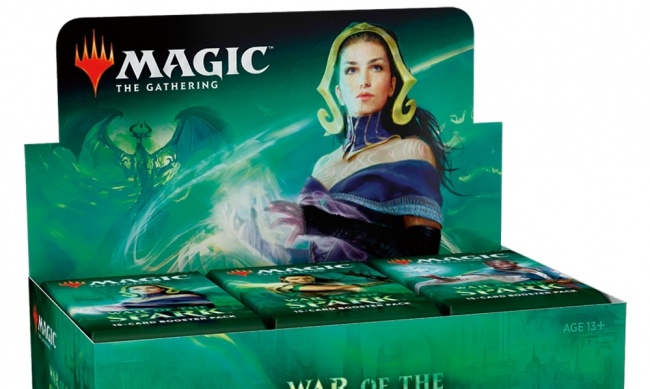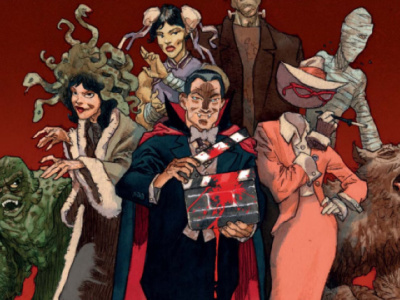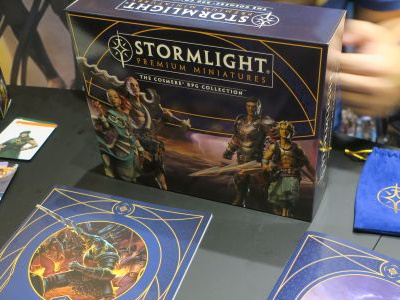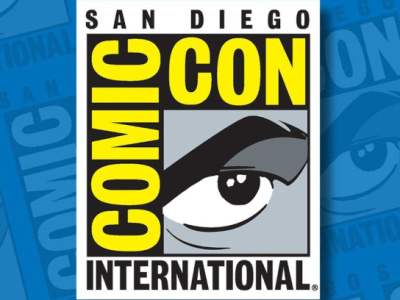Unless you don’t sell Magic: The Gathering at all, it’s not news to you that we just had a big weekend. The latest expansion, War of the Spark, releases Friday, and I’m guessing you had plenty of business for your prereleases. At my store in Columbus, Ohio, we pre-sold all 60 of our prerelease boosters with the special buy-a-box promo before our midnight event on the 27th. That’s never happened for us before. We typically have plenty left to sell during the weekend for those who didn’t reserve them in advance, and this is the first time we’ve sold through the entire allotment since Wizards of the Coast started offering this opportunity a year ago with Dominaria.
That bodes well for early sales. In fact, we started taking reservations for boxes without the promo this weekend. People are excited enough about this set that they want a box – often several – whether it comes with the promo card or not.
As exciting as that is for us, we were more interested in the logistics of how we ran our prerelease events. This was the last time the old WPN system would be in use before changing to the new one with tickets and engaged players (see “WotC Revamps Wizards Play Network”). We saw an opportunity to use this prerelease, which already had strong interest due to the cards, to change our approach to encourage greater attendance, turn more kits, and generate excitement that would lead to release-weekend sales.
We’ve been an Advanced Plus store for years. To meet that threshold, we needed at least one OP event with a minimum of 50 participants. Preleases were our best means to accomplish that, so we held three events with a cap of our seating capacity of 54 and no cap on the rounds. That usually meant seven-hour grinds that attracted a lot of players but also encouraged lots of drops, since they would get too tired to continue. A prize pool that was heavily weighted towards the top finishers brought in a large crowd hoping to do well enough to walk out with 30 or more prize packs.
But it caused two major problems. First, it was just as grueling for our employees as the players. Staffing the store required scheduling people to work shifts they usually don’t, and the added stress of all those extra bodies in the store wore people down. Plus, it disrupted the shoppers, since there were Magic players everywhere.
Second, we’ve tried to position ourselves as the casual-play store in a market with six competitors, and by setting up our prerelease prizing like we did, we were drawing competitive players who rarely shopped and never played with us.
So this time, we ran six tournaments, capping each at 32 players and four rounds. We also flattened our prizing considerably to encourage our casual players to come, while simultaneously sending a subtle message to hyper-competitive players that we weren’t the right venue for them.
Since we didn’t have to worry about hitting that 50-player threshold, we could make the change without fearing its impact on our WPN level. And shorter tournaments allowed me to schedule more comfortably, so that the staff wasn’t as stressed.
It worked. We received numerous compliments from participants who were happy to not have to commit seven grueling hours to the event. We saw many players participate in more than one prerelease, more so than usual. Cleanup was easier, since there were fewer players per tournament, and the events were shorter. And the staff wasn’t as tired.
Our attendance was weaker than hoped for at our midnight event and the first one Saturday morning. We have no way of knowing, but we suspect Avengers: Endgame opening might have had some influence there. But Saturday night and both Sunday events were at or near capacity.
And our Saturday sales were off the charts. Magic accounted for an eye-popping 58 percent and exceeded the total sales number for a typical Saturday. In addition to Magic product, we sold a lot of dice, sleeves, and mats. Sunday sales were double our usual numbers.
As we look ahead to Core 2020, we’re excited about the changes to WPN. We’ll be able to run nine events instead of six, which has us thinking about more, smaller events, with fewer rounds, so we can turn them faster. And yesterday’s announcement that prereleases can now be scheduled on Fridays, too, means even greater scheduling flexibility. We believe smaller, more frequent events will encourage larger participation overall and consequently, bigger sales.
War of the Spark gave us the perfect opportunity to test our strategy. The results in player enthusiasm, staff energy, and most importantly, sales, have us believing we have a winner.
John Phythyon has worked at the publisher, distribution, and retail levels of the hobby game industry. He’s currently a regular news contributor to ICv2 and is the events manager at The Soldiery Games & Cards in Columbus, Ohio.
The opinions expressed in this column are solely those of the writer, and do not necessarily reflect the views of the editorial staff of ICv2.com.








